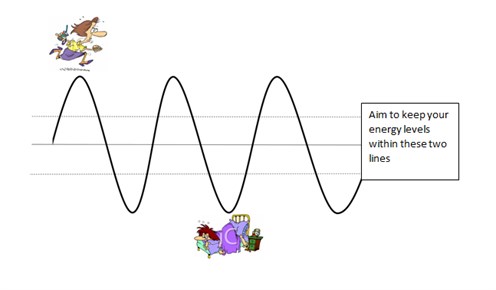Fatigue
Fatigue is a feeling of extreme physical or mental tiredness, or
both. Most of us feel tired after a long day, but if you have a
long-term medical condition such as arthritis you may experience a
tiredness that's quite different in quality and intensity and which
doesn't always improve after rest.
Fatigue and arthritis
https://www.versusarthritis.org/about-arthritis/managing-symptoms/managing-fatigue/
https://www.nras.org.uk/data/files/Publications/29259%20Fatigue%20Matters%20booklet.pdf
Below are some tips on managing fatigue:
- Pacing - Break tasks down into achievable parts and spread them
throughout the day or week and take short regular rest breaks.
Change your posture and activity regularly. Don't use exhaustion as
a guide on when to stop; change your task or rest before you start
to feel tired.
- Problem solving - It's not what you do it's the way you do it.
If a task causes a problem, look and see if you can change the way
you do it.
- Prioritising -If you write a list of tasks that you need to do,
you can put them in order of importance and decide what tasks you
can remove, delay or hand over.
Daily activity diaries:
- Some patients find that it can be helpful to use daily activity
diaries to get a picture of their energy and activity over the
week. This can help with planning how to get a health/life balance
over the week.
Click here for an
activity diary
Sleep
- Having a good sleeping pattern can improve your health. With a
rheumatology condition, symptoms such as pain may disrupt your
sleep, however, improving your sleep habits can improve your pain
levels and decrease inflammation caused by your rheumatology
condition. Top tips include; regular bed times and wake times,
avoid caffeine before bedtime, sleep in a cool, dark room and turn
off electronic devices at least an hour before bed.
https://www.versusarthritis.org/about-arthritis/managing-symptoms/sleep/
The link below is an NHS approved app to help improve your sleep
quality. It is free with a GP referral.
https://www.sleepstation.org.uk/
Boom and bust cycles:
Life can be hectic and feel like a never ending roller-coaster.
You may have noticed patterns of fatigue after busy periods in your
life. When you feel well, you may try and get as much done that you
can, and then the following week you experience a crash in your
energy and inability to complete tasks.
For example; imagine your energy as coins. You wake up and feel
you have five coins of energy. Walking to the shops may use up two
of those coins. Going to work may take up a further four of those
and leaves you with minus one coin of energy. This may lead to a
crash in energy the following day. If for example having a hot
bath, and a good meal increased your energy by two coins you can
then increase your energy store so that the next day you feel fit
again. This is an example of pacing your activity and knowing when
you have done enough.
Acknowledging that you have a certain amount of energy and that
some tasks will drain you of that energy and some will increase it
can help you in planning your week.
